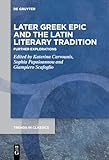Later Greek Epic and the Latin Literary Tradition : Further Explorations / ed. by Katerina Carvounis, Sophia Papaioannou, Giampiero Scafoglio.
Material type: TextSeries: Trends in Classics - Supplementary Volumes ; 136Publisher: Berlin ; Boston : De Gruyter, [2022]Copyright date: ©2022Description: 1 online resource (VII, 216 p.)Content type:
TextSeries: Trends in Classics - Supplementary Volumes ; 136Publisher: Berlin ; Boston : De Gruyter, [2022]Copyright date: ©2022Description: 1 online resource (VII, 216 p.)Content type: - 9783110791792
- 9783110791983
- 9783110791907
- online - DeGruyter
- Issued also in print.
| Item type | Current library | Call number | URL | Status | Notes | Barcode | |
|---|---|---|---|---|---|---|---|
 eBook
eBook
|
Biblioteca "Angelicum" Pont. Univ. S.Tommaso d'Aquino Nuvola online | online - DeGruyter (Browse shelf(Opens below)) | Online access | Not for loan (Accesso limitato) | Accesso per gli utenti autorizzati / Access for authorized users | (dgr)9783110791907 |
Frontmatter -- Contents -- Abbreviations -- Preface: Later Greek Epic and the Latin Literary Tradition -- Latin and Later Greek Literature: Reflections on Different Approaches -- The Poet as Sailor: Claudian between the Greek and Latin Traditions -- Sinon and Laocoon in Quintus of Smyrna’s Posthomerica: A Rewriting and De-Romanisation of Vergil’s Aeneid? -- Odysseus the Roman: Imperial Temporality and the Posthomerica -- Triphiodorus and the Aeneid: From Poetics to Ideology -- ἄντρα περικλυτά: Revisiting Mythical Places in the Orphic Argonautica -- Pantomime Games in the Dionysiaca and Vergil’s Song of Silenus -- Nonnus’ Phaethon, Ovid, and Flavian Intertextuality -- List of Contributors -- General Index -- Index Locorum
restricted access online access with authorization star
http://purl.org/coar/access_right/c_16ec
The volume offers an innovative and systematic exploration of the diverse ways in which Later Greek Epic interacts with the Latin literary tradition. Taking as a starting point the premise that it is probable for the Greek epic poets of the Late Antiquity to have been familiar with leading works of Latin poetry, either in the original or in translation, the contributions in this book pursue a new form of intertextuality, in which the leading epic poets of the Imperial era (Quintus of Smyrna, Triphiodorus, Nonnus, and the author of the Orphic Argonautica) engage with a range of models in inventive, complex, and often covert ways. Instead of asking, in other words, whether Greek authors used Latin models, we ask how they engaged with them and why they opted for certain choices and not for others. Through sophisticated discussions, it becomes clear that intertexts are usually systems that combine ideology, cultural traditions, and literary aesthetics in an inextricable fashion. The book will prove that Latin literature, far from being distinct from the Greek epic tradition of the imperial era, is an essential, indeed defining, component within a common literary and ideological heritage across the Roman empire.
Issued also in print.
Mode of access: Internet via World Wide Web.
In English.
Description based on online resource; title from PDF title page (publisher's Web site, viewed 29. Mai 2023)


